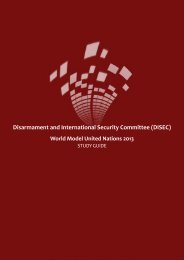Social, Humanitarian and Cultural Committee (SOCHUM)
Social, Humanitarian and Cultural Committee (SOCHUM)
Social, Humanitarian and Cultural Committee (SOCHUM)
You also want an ePaper? Increase the reach of your titles
YUMPU automatically turns print PDFs into web optimized ePapers that Google loves.
Saharan Africa. On her website, for example, Janet<br />
Museveni, the First Lady of Ug<strong>and</strong>a <strong>and</strong> the national<br />
minister for the Karamoja region, calls upon pastoral<br />
Advanced farming equipment has allowed the agricultural<br />
industry of certain developed nations to flourish at the expensive<br />
of indigenous ways of life.<br />
farmers to settle their livestock on one location <strong>and</strong><br />
begin practicing sedentary agriculture. 126<br />
One of the regional industries in which the<br />
liberalization of trade has had the most effect<br />
is mining in Africa. Many African countries have<br />
liberalized their mining laws over the past thirty years<br />
to encourage foreign investment, in the hopes that<br />
this will help boost their economic growth <strong>and</strong> overall<br />
gross domestic product (GDP), a primary measure of<br />
economic development. In response, many British,<br />
American, Canadian, <strong>and</strong> Australian companies<br />
have established operations on these previously<br />
untouched l<strong>and</strong>s with little regard for the indigenous<br />
populations that live <strong>and</strong> farm there. The presence<br />
of these transnational companies is so extensive<br />
that over 2,600 bilateral agreements had been<br />
signed between African governments <strong>and</strong> foreign<br />
mining companies by 2008. 127 As may be expected,<br />
these transnational mining companies generally do<br />
not take environmental factors into consideration<br />
when building their infrastructure <strong>and</strong> implementing<br />
their extractive techniques, which further harms<br />
the situation in which indigenous populations<br />
find themselves. In Africa, the most common<br />
environmental impact is the dissemination of toxic<br />
chemicals in the water supply, which has ruined crops<br />
<strong>and</strong> farming l<strong>and</strong> <strong>and</strong> has caused dangerous illnesses<br />
<strong>and</strong> problems with pregnancies <strong>and</strong> childbirth. 128<br />
Because they are no longer able to practice their<br />
traditional farming techniques, which are usually<br />
relatively sustainable, indigenous peoples are often<br />
forced to employ other, less environmentally-friendly<br />
methods; this worsens the situation <strong>and</strong> leaves them<br />
with no means of subsistence or employment. This<br />
pattern is not only evident in the African mining<br />
industry but is also observed in Indonesia’s nickel<br />
industry <strong>and</strong> the Amazonian natural gas industry. 129<br />
Disregard for Indigenous L<strong>and</strong> Rights<br />
Another cause of the impoverishment of indigenous<br />
populations is the disregard for local l<strong>and</strong> rights, an<br />
issue that is closely connected to the liberalization of<br />
trade regulations. As alluded to above, in the process<br />
of creating the infrastructure for massive agricultural<br />
or resource extraction industries in a developing<br />
country, many governments <strong>and</strong> transnational<br />
corporations either explicitly or implicitly expel the<br />
indigenous residents from their l<strong>and</strong>. in many Asian<br />
<strong>and</strong> African nations, indigenous peoples have no title<br />
to the l<strong>and</strong> on which they reside, <strong>and</strong> the government<br />
has the complete authority to distribute that l<strong>and</strong><br />
to members of the country’s ethnic majority or to<br />
domestic or foreign companies. 130 When their l<strong>and</strong><br />
is taken away, most indigenous peoples lose their<br />
traditional methods of subsistence <strong>and</strong> are either<br />
forced to live in extreme poverty or migrate to a<br />
city for employment, another problem that will be<br />
discussed.<br />
The problems with the legal frameworks for<br />
indigenous l<strong>and</strong> rights are numerous. Many<br />
countries simply do not have such laws in the first<br />
place, so indigenous populations have no authority<br />
34<br />
Melbourne Host Directorate PTY LTD | Office of Media <strong>and</strong> Design

















